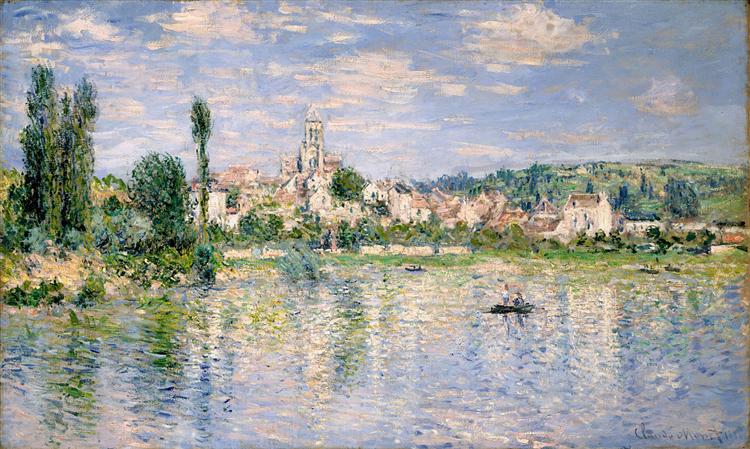Beskrivelse
Claude Monet's Vetheuil in Summer, painted in 1880, is a splendid example of the Impressionist style that defines much of the French artist's output. This painting not only captures the essence of a particular moment in the landscape of Vetheuil—a town in the Île-de-France region where Monet resided for several years—but also reflects the artist's technical and emotional evolution in his quest to depict light and atmosphere.
The composition of the painting is dominated by a skyline on which the silhouette of the church of Vetheuil is drawn, an architectural presence that anchors the work in space and time. The landscape extends into the foreground, where Monet employs a rich palette of greens, yellows and touches of blue and grey, evoking the lush vegetation of summer. The loose, rapid brushstrokes characteristic of Impressionism generate a vibrant sense of movement and life. This use of the visible brushstroke technique reinforces the idea of capturing the immediacy of the aesthetic experience.
Light is a pivotal element in Vetheuil in Summer. Monet, through his skillful manipulation of color and tonality, achieves an almost ethereal depiction of the landscape. Sunlight filters and plays through the treetops and over the water surface of the River Seine, reflecting the splendor of nature in the summer season. The overall atmosphere of the work radiates warmth and vitality, imbuing the scene with a contemplative serenity. It is a reminder of seasonal time and, at the same time, a reflection of Monet's connection to the natural environment.
Although no human figures appear prominently in this painting, their presence can be inferred through the context of the landscape. The intimate relationship between man and nature is a recurring theme in Monet's work, and although the human figure may be absent here, the setting suggests the possibility of everyday activities, such as walks or moments of reflection by the river. This subtle approach invites the viewer to project their own narrative onto the scene, making the viewing experience more personal and introspective.
It is also interesting to consider the place of Vetheuil in Summer within the larger corpus of Monet's work. This period of his life was marked by a renewed focus on the exploration of light and color, with works that balance naturalistic representation with a more abstract approach to pictorial formulation. Compared to other works from this period, such as The Water Lilies, Vetheuil in Summer demonstrates Monet's ability to capture a fleeting essence; in this case, the splendor of summer on the banks of the Seine.
Claude Monet, considered one of the founders of Impressionism, broke with previous artistic conventions and sought to capture the perceptual experience of light, color, and time. Vetheuil in Summer is a testament to his mastery in translating the natural world into a visual experience that resonates with the viewer. The work thus becomes not only a portrait of a specific time and place, but an iconic example of how art can capture the transience of life itself.
KUADROS ©, a famous painting on your wall.
Hand-made oil painting reproductions, with the quality of professional artists and the distinctive seal of KUADROS ©.
Painting reproduction service with satisfaction guarantee. If you are not completely satisfied with the replica of your painting, we will refund 100% of your money.

